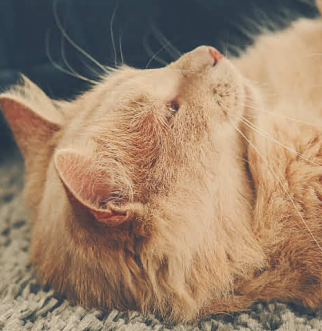

Keeping the house clean can be a challenge for anyone who owns pets. There’s nothing worse than getting home after a long day at work to a terrible odor or mess on the floor. Spraying is one of the most common behavioral problems in cats, along with scratching. But while your first instinct may be to discipline your cat for this undesirable behavior, keep in mind that this is a natural behavior for your cat, and it should be redirected instead of punished.
Why Does My Cat Spray?
In the wild, cats leave scent signals to communicate with other cats through rubbing, scratching, urinating, and spraying. Scent signals let cats know when another cat has claimed an area as their own, when they were there and might return, and if they are looking for a mate. While most spay and neutered cats who live indoors do not feel the need to spray, those who do are typically under stress and want to surround themselves with their own scent for protection. Even though you’ve created a safe, nurturing environment for your cat, she may still feel distressed and want to mark her territory.
What to Do if Your Cat is Spraying
First, determine whether your cat is spraying or urinating. Cats urinate by squatting onto a horizontal surface; spraying occurs standing up. The cat makes a treading motion with her back feet and quivers her tail, leaving her scent mark on a vertical surface.
If your cat has begun urinating outside of their litter box, be sure that the box is regularly cleaned. If the behavior persists, take them to the veterinarian to check for lower urinary tract disease and cystitis. A urinary tract infection can cause your cat to urinate while standing, confusing the act with spraying. Cystitis can also cause symptoms of lower urinary tract disease, including frequent attempts to urinate, straining to urinate, crying while urinating, and blood in urine. Cats who suffer from recurrent cystitis often benefit from increased fluid intake, which may require switching your cat to wet food might be a helpful part of an overall treatment plan. Consult your veterinarian for help managing health concerns and nutrition.
Consider recent changes to your household that may be affecting your cat’s behavior—especially if they spend most of their time indoors. Unsettling changes can include the arrival of a new baby or pet, a house move, schedule changes, or even rearranging furniture. To deter threats from other household or neighborhood cats, block access to cat flaps or doors. Once your cat feels that their territory is not threatened, they will no longer feel the need to mark it.
Moving furniture or redecorating can be upsetting to a cat, because it removes their scent from places they have designated around your house. By spreading their scent to familiar places, they may feel less inclined to spray. Rub a soft cotton cloth gently around your cat’s face; this is where their individual scent and pheromones are produced. Apply the cloth several times per day to areas where your cat is spraying. Synthetic pheromones are also available through your veterinarian.
Cats also feel most comfortable when they are secure. You can make your cat feel a sense of security by limiting their patrol area to one or two rooms.
Once your cat has urinated or sprayed in your house, she may return to that spot again if the area isn’t thoroughly cleaned.
- Keep your cat away from the area as long as possible. For example, place a piece of furniture on the spot.
- Wash the area with enzyme-containing laundry detergent and rinse thoroughly. Then, mix a solution of 50 percent white vinegar and water, and spray.
- Spray and scrub the area with rubbing alcohol and dry. Test delicate surfaces on a small area before application.
- Talk to your veterinarian about a stain and odor remover to get rid of residual odors.
- Do not use an ammonia-based cleaner. Because urine contains ammonia, this might attract your cat to return to the spot.
Finally, with any behavioral issues your cat might display it is important to never yell at or punish them. This can only cause a situation such as spraying to get worse as they may become more stressed. Cats do not understand punishment, to correct a behavior problem is best to train them and continue to show them love and affection. Slowly over time you can help redirect poor behaviors and have the cute and cuddly cat you’ve always wanted.


















